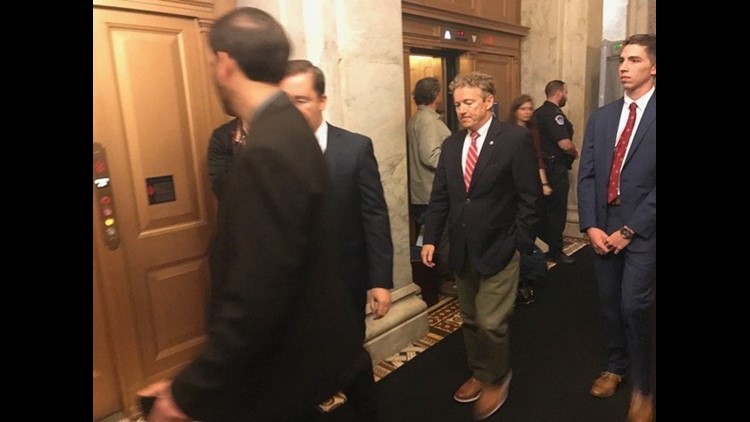(CNN) — Republican senators will include a repeal of Obamacare’s individual mandate in the revised version of the chamber’s tax overhaul to be released by the Senate finance committee Tuesday afternoon, according to two GOP aides. The committee’s Republicans were unanimous in their support for adding the repeal.
GOP senators have been initially receptive to the proposal, including Arizona Sen. John McCain, who cast a dramatic deciding late night vote that killed Republicans’ efforts to repeal and replace Obamacare earlier this year.
“Yes,” he said when he was asked if he is leaning toward supporting the mandate repeal as he came out of the policy lunch.
Sen. Rand Paul announced earlier Tuesday he planned to offer an amendment to the Senate tax bill to repeal the individual mandate that requires individuals to have health insurance or face a fine. President Donald Trump has also endorsed repealing the individual mandate as part of the tax bill.
Sen. Susan Collins, a Republican from Maine, told reporters on Tuesday afternoon she has concerns about repealing the individual mandate in the tax bill.
“I personally think that it complicates tax reform,” she said.
Collins was also one of three Republicans who voted against the GOP senate bill to repeal the individual and employer mandate in July. That shell of a bill was intended to get the Senate and House to conference on a health care bill and did not pass the Senate.
Impact on tax reform efforts
Despite Trump’s support for the idea, GOP leaders in both chambers have been wary of bringing what has been a toxic debate over health care into the tax overhaul process. The Congressional Budget Office has estimated that repealing the individual mandate could give tax writers an additional $338 billion to reduce taxes over the next decade. The CBO also projects a mandate repeal would lead to 13 million fewer people with health insurance — a key Democratic attack line during the health care debate.
In a series of tweets, Paul, R-Kentucky, said he intended “to amend the Senate tax bill to repeal the individual mandate and provide bigger tax cuts for middle income taxpayers. The mandate repeal is a promise we all made and we should keep. It also allows an additional $300 billion+ in tax cuts.”
Paul is not on the finance committee, the committee with jurisdiction over the tax reform process, but his tweets come after Sen. John Cornyn, the majority whip, told reporters Tuesday that Republicans on that committee met Monday night and discussed the prospects for repealing the individual mandate. Sen. Tom Cotton, a Republican from Arkansas, has also been pushing for the change.
Cornyn told reporters that no final decisions had been made and that members were still discussing their options.
“It is under discussion,” Cornyn said Tuesday. “I can’t tell you now. We are going to be talking about it with the whole conference at our noon meeting.”
But, there is little arguing that the Senate needs more revenue to pass their bill under the Senate’s arcane rules. Under what is known as the Byrd Rule, the GOP’s tax bill cannot add to the deficit outside the 10-year window if Republicans want to pass their bill with a simple majority vote. Right now, it does. In his tweets, Paul argued that including the provision would give Republicans more flexibility once they have to sit down with the House to combine the two bills in conference.
Paul also suggested that his amendment could create enough revenue to shore up divisions between the House and Senate bills. Many House Republicans have already voiced concerns that they could not vote for a bill that repeals the state and local property tax deduction, which the Senate bill does.
“My amendment will fix a problem in the Senate bill where many taxpayers would see a tax increase because of the loss of state and local deductions,” Paul tweeted. “I will introduce a similar deduction as the House plan, making the tax reform plan more fair for everyone.”



